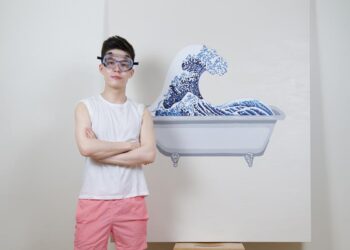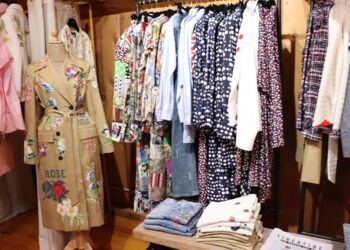You may know Robert Davi from roles like The Goonies, Licence to Kill and The Expendables 3, but in his latest project, the actor is showing off a different side – his impressive vocals and adoration of Frank Sinatra. In Davi’s Way, which will screen at this year’s Hamptons International Film Festival, Davi sets out to pull off the greatest tribute to Ol’ Blue Eyes, which was inspired by The Main Event – a 1974 live album and television special. We caught up with Davi to discuss the ambitious quest, his connection to the Hamptons and more.
Now you’re classically trained, and even trained in Florence. Why did you choose to pursue acting over music?
RD: I trained with a guy named Tito Gobbi, who was the Marlon Brando of the opera world. Tito Gobbi was the greatest singing baritone in the opera world and I studied in Florence, Firenze, with him. That was my first love, as it was Sinatra’s, oddly enough. Early on, he studied with someone from the Metropolitan Opera, a guy named John Quinlan. There was something in the bel canto, not just opera, but a certain style of Italian singing that I responded to deeply. I was pursuing them both at the same time – it wasn’t one over the other. Concurrently, while I was in school, while I was winning awards for acting, I was winning awards for singing, in high school. One of the reasons why I decided to continue on with the acting was the opera world is fraught with a very long process, and I did love the acting, as well. The acting took off sooner, and then you get involved with that. Also, I had a little bit of a vocal strain at a certain period of time that made me lay off the singing, and while I was lying off the singing, I was pursuing the acting. I had always been affected by films, as well, of course – and great films. I studied with Stella Adler and I didn’t like the representational aspect of most opera singers. Most of the opera singers had not a false, but over theatrical way of presenting. It didn’t feel organic and Gobbi was one of the artists that was able to, along with Maria Callas, incorporate not just the sound, but the emotion, the technique of the singing. So, I didn’t want to become this stiffened – and that was just a personal choice, at that time. And, the idea was also to go to film first, get enough notoriety in film that I could interpret some of the opera stuff the way I would want to interpret it.
The film largely revolves around you paying tribute to Frank Sinatra. Do you remember the first time you heard him?
RD: Probably in utero. Because, don’t forget – not that I remember it, but in the 40s, I was born in the 50s, my mom was pregnant in the 50s, Sinatra had that big come back around then, From Here to Eternity. And just everyone in the 40s, you got to realize, for his time period, take Justin Bieber and put it on steroids – there was no one like Sinatra before that. And you didn’t have the amount of outlets that you have today and the variety that you have today. So, the Great American Songbook united the nation unlike any other music, because there weren’t so many different kinds of communications. Everyone, young and old, was responding to Sinatra. So, the first time that I physically remember, it was as a youth. He always seemed to be there, let me put it that way. I can’t remember the exact first time, but I can remember the effect his voice had on me.
And what was that?
RD: It was one of communicating to you, even as a young person. The Sinatra interpretation of the music, as opposed to some other music that you were listening to – where you felt like they were singing at you – you felt Sinatra was singing to you. It’s a very intimate art form, and that’s what I responded to – the intimacy of his performance.
What was it like to hear Quincy Jones, who is in the documentary, sing such high praises about your Sinatra covers?
RD: That was a total surprise. I met Quincy, he had heard my album, someone played the album and he flipped over it. And then, he brought 17 people to my show, a show that I was doing, and I didn’t know. He was there with these people and then the next day, people said to me, “Robert, you wouldn’t believe what Quincy said about your show on his Facebook page.” Sinatra, don’t forget, has passed on, and Quincy is one of the greatest world figures, of all-time. I mean he’s up there with Muhammad Ali, as far as I’m concerned. His humanitarian work, his contribution to the world and music – he’s really an amazing man. Even political divides don’t affect his humanity. So, to me, that was extremely meaningful. That, along with Phil Ramone producing my album. Phil Ramone and Quincy Jones were very close. Phil Ramone was one of the greatest record producers of all time. I don’t know if they talk about him enough in the film, but he produced Sinatra, Barbra Streisand, all of Billy Joel, Paul McCartney – Phil Ramone was one of the major record engineers and producers.
Frank Sinatra played a huge part in you getting your first role. What did it mean to you for him to be the one that helped you break into the business?
RD: In an Italian household, there were two figures for me growing up – you had the Pope and you had Frank Sinatra, and, of course, Tony Bennett. And not necessarily in that order. Sinatra, to everyone, even Tony Bennett, was such a huge influence because he had mastered not only music, but film and radio. His voice defined not only a certain period of time, but America and what America meant to the world. Sinatra grew up, as my grandparents did, when being Italian was very, very prejudice against, but they didn’t let it bring them down or use it as an excuse. And that’s what Sinatra did. He was the first artist to come out in a major way against anti-Semitism and racial bigotry. And those are huge things back in the 50s and 60s and 70s – and he was doing this in the 40s. So, my parents, the effect that he had on the Italian community, in terms of all our friends at the house were multicultural. We weren’t just Italians. My dad’s close friend was a black gentleman – this was back in the early 50s when Tony Bennett was reprimanded for having lunch, when he was in the military, with a black man. So, he meant quite a bit, and then to do your first film with this iconic figure… My mom passed away right after the film was completed. Oddly enough, my mother was born in Southampton. I have roots in Southampton, Bridgehampton, Sag Harbor. My grandfather, her father, Stefano Rullo, when he came from Naples, he went to Pennsylvania and worked coal mines. He came to New York, became a bootlegger, we never found out how he became a bootlegger, but his partners were Marshall Field and Joseph P. Kennedy, Sr., and their house was on Jobs Lane. They used to store the liquor at Marshall Field’s house – who had all those department stores. These were guys that he was directly involved with, in terms of distrusting alcohol throughout the state. And, I think back, when I saw The Great Gatsby , the film, my grandfather probably helped supply all the alcohol to all these Southampton parties, back then. My grandmother told a story that when they used to leave from Southampton to go into the City, because he had apartment buildings in Queens – I was born in Astoria, Queens – they had apartment buildings in Queens and Manhattan, different businesses, and she wanted to pick blueberries on the side of the road and he wouldn’t stop, so my grandma used to throw her purse out the window. She never had less than $4,000 cash, back in the 20s, and he would then stop the car and she would pick blueberries. And, he never had a record.
It was touching to watch you perform with your daughter Ariana, who wants to be a professional singer, for the first time. What was the significance of performing with her during the Frank Sinatra tribute?
RD: Well, of course, you have your children and it’s hard to even hold it in – emotionally. My daughter, she’s a sweet, lovely girl, but she doesn’t have the drive or the belief in herself. As it says in the film, I get touched up thinking about it, no one can give you a career. You have to have that inner drive. She wants it, but she doesn’t know how to go for it, she’s too shy. To see her perform and come on stage and feel comfortable, you know, she has talent – that was very touching, very moving, for me. She has a really beautiful sound and voice. She’s a young girl still, 26, and innocent. She was kind of sheltered. I had a different upbringing – my dad worked three jobs. You know, it wasn’t as easy as they had it.
After the tribute was over, how did you feel? Were you relieved? Were you upset?
RD: Relieved isn’t the term. The term for me was frustrated, and disappointed. I was depressed because it wasn’t what I wanted, what I envisioned. And the film doesn’t bring this out, but I had told these guys that I had venues. I had 15,000 people. They had to stop filming at a certain point in time. They wanted to stop filming in May, and they don’t really bring this into the story enough – but all of the sudden, they tell me in April, “Oh, we have to have this thing in May.” And I go, “Wait a minute, I’m touring the world.” I did 5,000 people in Estonia. I’m frustrated they didn’t travel with me to Sweden, Latvia, Budapest, Australia – I mean huge concerts with great response, and beautiful production value. And then I had this whole thing set up that if we wouldn’t get Madison Square Garden, at least I could do it at Foxwoods Casino or I could do it at Eisenhower Park – 15,000 people – which I did. I did the tribute on the 12th at Foxwoods, which went great, and the one at Eisenhower Park, so that frustrated me too, because had we waited… But, you know what? I guess it works, thematically.
Will you try another tribute again?
RD: I don’t know if it brought it up in the film, the United Nations. I’ve been going around the world; I’ve been to China, I sang at the General Assembly, the Security Council. I just sang, recently, for the Prime Minister of Bangladesh – the 34th most powerful woman in the world, according to Forbes Magazine. The United Nations had an event where her son got an award and they put me on this special program on competitiveness and sustainability, and we’re talking about doing a world tour of me and the music. That kind of thing is what I would do. I would want to bring a certain kind of unity and awareness to different things. Even in the 80s, I wanted to do something with Unicef, and I wrote a song for Unicef, but I didn’t have any means or the celebrity. You have to have a certain kind of celebrity to pull something that big together, but I had a whole thing called The Spirit of Man that I wanted to do worldwide concerts in celebration for the spirit of man. So, as I move forward, that would be the kind of thing that I have. Here I was in Estonia, doing a concert for 5,000 people, and not many people know the song My Way – Gorbachev in the 80s, My Way had just become a famous song, and Gorbachev in a satirical, kind of cynical manner coined the term the Sinatra Doctrine and My Way was the song because the Baltic states in the Warsaw Pact wanted to go their own way and secede from the Soviet Union, so joking he says,” Yeah, we’ve got the Sinatra Doctrine now.” Not many people know that, but I did, of course, and before I sing My Way, I say this to the whole country, “Well, the President of Estonia sent me a message.” He heard about it because of what’s happening in Russia right now and the power grab that Putin has. The music and the message, to me, is something that is imperative and that’s what drives me know.
Davi’s Way will screen on Saturday, October 8th at 5:15 p.m. at UA East Hampton Cinema 6 – UA-2 (30 Main Street, East Hampton) and Monday, October 10th at 5:15 p.m. at UA East Hampton Cinema 6 – UA-4. Tickets are $15.
For more information, visit hamptonsfilmfest.org.






